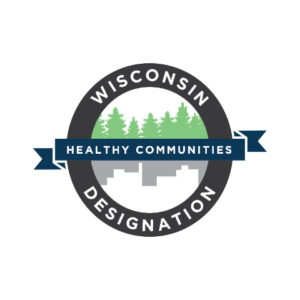Now in its second application cycle, the Wisconsin Healthy Communities Designation is offered by the Mobilizing Action Toward Community Health (MATCH) group of the UW Population Health Institute in collaboration with diverse statewide groups. The program, funded by the Wisconsin Partnership Program, is designed to recognize and encourage achievements in health improvement in Wisconsin, and to serve as a guide for communities to expand and enhance their health improvement efforts.
 The designation recognizes communities that focus efforts across the multiple factors that influence health, including health behaviors, clinical care, social and economic factors, and the physical environment.
The designation recognizes communities that focus efforts across the multiple factors that influence health, including health behaviors, clinical care, social and economic factors, and the physical environment.
“We know that communities that pay attention to the many factors that influence health – including the social determinants of health, like housing, transportation, safety and education – have a greater chance of creating conditions where all residents have the opportunity to be healthy,” said Sheri Johnson, director of the Population Health Institute.
The program’s definition of community is broad and can include neighborhoods, municipalities, counties, regions and other self-defined, place-based communities in Wisconsin. Additionally, the program uses a three-tiered approach – gold, silver and bronze – which allows communities to apply for the designation level that makes the most sense for them.
“This initiative was developed in response to a request from rural communities across the state and gives communities of all shapes and sizes – rural and urban – an opportunity to be recognized for the great work that they are doing to improve their own health,” said Tim Size, executive director of the Rural Wisconsin Health Cooperative, a collaborative of 42 rural hospitals and local health systems, and a member of the UW Population Health Institute’s advisory board.
In 2018, 31 communities received either a bronze, silver or gold designation. Four communities received a gold designation. The tiers are meant to provide a trajectory and serve as a guide for communities as they work toward comprehensive and sustainable solutions for better health – the gold level representing the most difficult to achieve.
However, receiving a designation, at any level, does not indicate that health or health equity has been achieved in a community; rather, the designation is meant to provide concrete recognition of the efforts and the many partners working together improve health in their communities.
The Healthy Community Designation program is currently accepting letters of interest through Jan. 17, 2020. New designees will be announced in September 2020.
To learn more about the program and the application process, visit the program website.
More about the designation
The Wisconsin Healthy Communities Designation program is an initiative of the Mobilizing Action Toward Community Health (MATCH) group’s Making Wisconsin the Healthiest State project at the University of Wisconsin Population Health Institute. The Making Wisconsin the Healthiest State project, funded by the Wisconsin Partnership Program of the UW School of Medicine and Public Health, seeks to help us understand and improve health across Wisconsin.
 The designation recognizes communities that focus efforts across the multiple factors that influence health, including health behaviors, clinical care, social and economic factors, and the physical environment.
The designation recognizes communities that focus efforts across the multiple factors that influence health, including health behaviors, clinical care, social and economic factors, and the physical environment.
